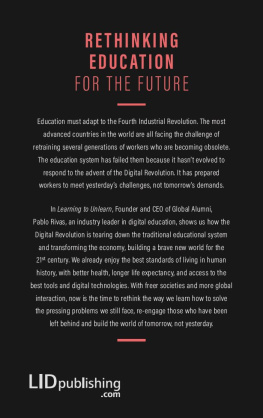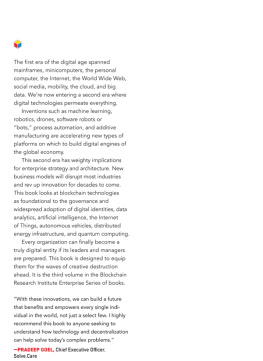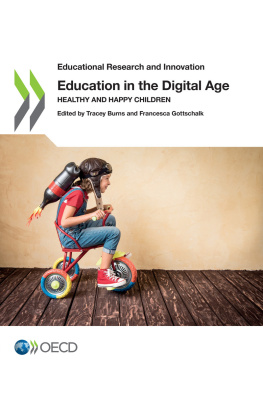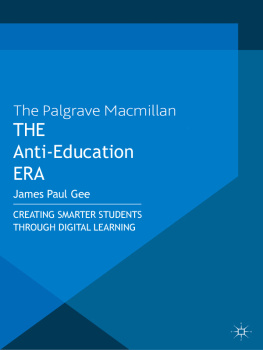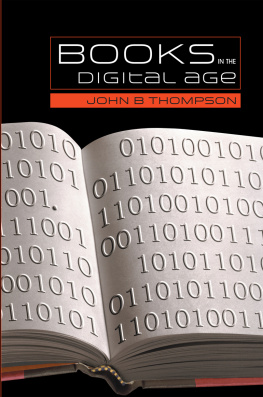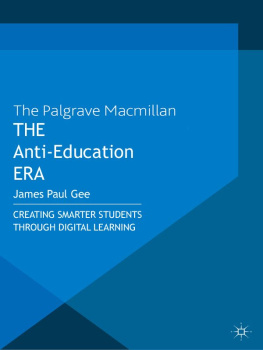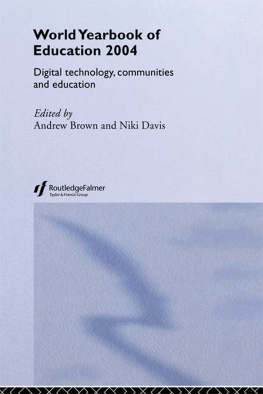Table of Contents
Guide


Being my first book, I need to remember
all the people who are with me every day.
Without you all,
this adventure would be meaningless.
I want to remember my family for their
unconditional support, especially my mother
for being an inexhaustible source of dedication
and passion.
To my wife, Natalia, always for her love,
smile and patience.
To my son, Pelayo, who has the duty to leave
the world better than he found it and education
is a great way to achieve this.
CONTENTS
INTRODUCTION:
LEARNING EVERY DAY
Sight is our most important sense, and it is also the most highly developed. But centuries ago we saw differently. Primitive humans were able to perceive hundreds of nuances in nature that we do not see today. Several studies have concluded that we learned to better distinguish the shades of colours of foods in order to select those that were the ripest. Similarly, the eye has gone through an extensive process of evolution in order to detect moving objects at a great distance, both to identify prey and to anticipate potentially dangerous situations.
Today, our eyesight may not be so accurate in these situations in fact, we are actually becoming more and more near-sighted. However, we can perceive and process large amounts of quickly moving stimuli only a few centimetres away from our eyes: from television to smart-phones, the world of technology is forcing us to develop new skills.
In other words, we are losing some of our interest in the outside world because now, much of the time, the screen of a tiny smartphone can access infinity from the palms of our hands.
Experts believe that it is still too early to know how our current way of life will affect the evolution of our bodies and our senses. However, what is certain is that from prehistoric times to the present today, human nature has not stopped evolving. Whether knowingly or not, we learn every day. Our bodies learn. Our brains learn.
We must assume that if, in its wisdom, our unconscious self tends towards continuous learning, our conscious self should also strive to fulfil that natural inclination and not limit itself not put up obstacles against an evolution that would lead us to be more intelligent, at least in the biological sense of the term.
The Greeks began their formal education at the age of seven. They went through several formative stages until they reached the age of 20, when they were considered to have encountered all of the subjects that would allow them to function throughout their lives. However, this was only the beginning.
Learning continued in adulthood, focusing on the theory and practice of concrete professional skills. The Greeks were also encouraged to form a love of wisdom and to adhere to the ideal of personal development throughout life, because, among other reasons, the elderly were deemed to be the living representation of wisdom, worthy of respect and perceived as the intellectual and moral axis of society.
All of this may seem somewhat archaic to our 21st-century selves, given the tendency of our labour systems and ever-demanding production chains to push the older generations out of work and prominent positions in society. This is a grave mistake of our time that must be corrected. Accumulated experience is the greatest asset of civilization. Experience gained over centuries, combined with the capacity for innovation, is the great engine of technological, economic, cultural and social progress.
What can we learn from these distant ancestors? What can we learn from the biological evolution of the eye? That is precisely the lesson: we must learn every day. We must innovate every day. We must grow every day.
Another way that we are changing is the sense of personal competitiveness we have in work and business. Without a doubt, being more competitive is changing us on the inside and perhaps on the outside too. Whether we like it or not, our competitiveness will continue to grow exponentially in the coming decades as the numbers of human beings on the planet who are capable of performing the same functions as each other continue to grow.
Although it may seem paradoxical, this competitiveness is being paralleled by a growth in collaborative experiences. Collaboration does not cancel out competition; in the end, in work, as in the distant processes of the struggle between species, we all seek out the best. Its already happening. We see it every day.
Fortunately, technology has put in our hands a much greater pool of knowledge than our parents and grandparents could ever have fathomed. But the resources our children and grandchildren will enjoy will be even greater. The feeling that everything is going faster and faster is not a quirk related to age. It is real. We have gone from evolution to disruption (a process that will be discussed further in ).
If you want a taste of what to expect, you can start by memorizing a motto: throughout your life, learn without respite. And learn this related motto too: innovate every day of your life.
Place your educational goals on a distant time horizon and forget about the short term. The short term is disappearing, as it is getting shorter and shorter. While you are busy making short-term plans for your job training, others are already thinking about the medium and long term. They are overtaking you and making you obsolete. Its not that you always have to worry about whats happening around you you dont want to be first just for the reward. Even first place wont have a long term. This personal obsession with professionally achieved goals is as ephemeral as the goals themselves.
And this is a vital attitude: your professional goal should be to never reach the finish line, to get used to not stopping. This is figurative, of course, but do hurry up. Move as quickly as you can.
PART I
YOU CAN FLOAT EVEN IF THEY TAKE THE FLOOR AWAY FROM UNDER YOU
BREAK ALL YOUR PARADIGMS: LEARN TO UNLEARN
In the waters of the 21st century, we are out of our depth. This is hard for us to get used to, because the water only reached our ankles in the 20th century. With the latest global technological revolution the Fourth Industrial Revolution new factors have caused the floodwaters to rise to historic levels, and their depths are now beyond what we are able to decipher. There are two possible approaches: dive like crazy, attempting to see the impossible and drowning when we try to catch a breath, or let ourselves float, taking full advantage of the tide.
An example makes this more clear. Not so long ago, when preparing breakfast, you might have warmed your milk in a saucepan on the burner of a propane stove. You had to know how to open the carton, calculate the amount of milk you needed for a cup, measure the intensity of the heat, and master the art of knowing when the milk was hot enough before it foamed and spilled out over the stove. You also probably had to know the necessary amount of coffee beans so that after grinding them, you could fill the coffee pot, add the right amount of water and heat it as well. This straightforward process easily became a learned routine for many people.

